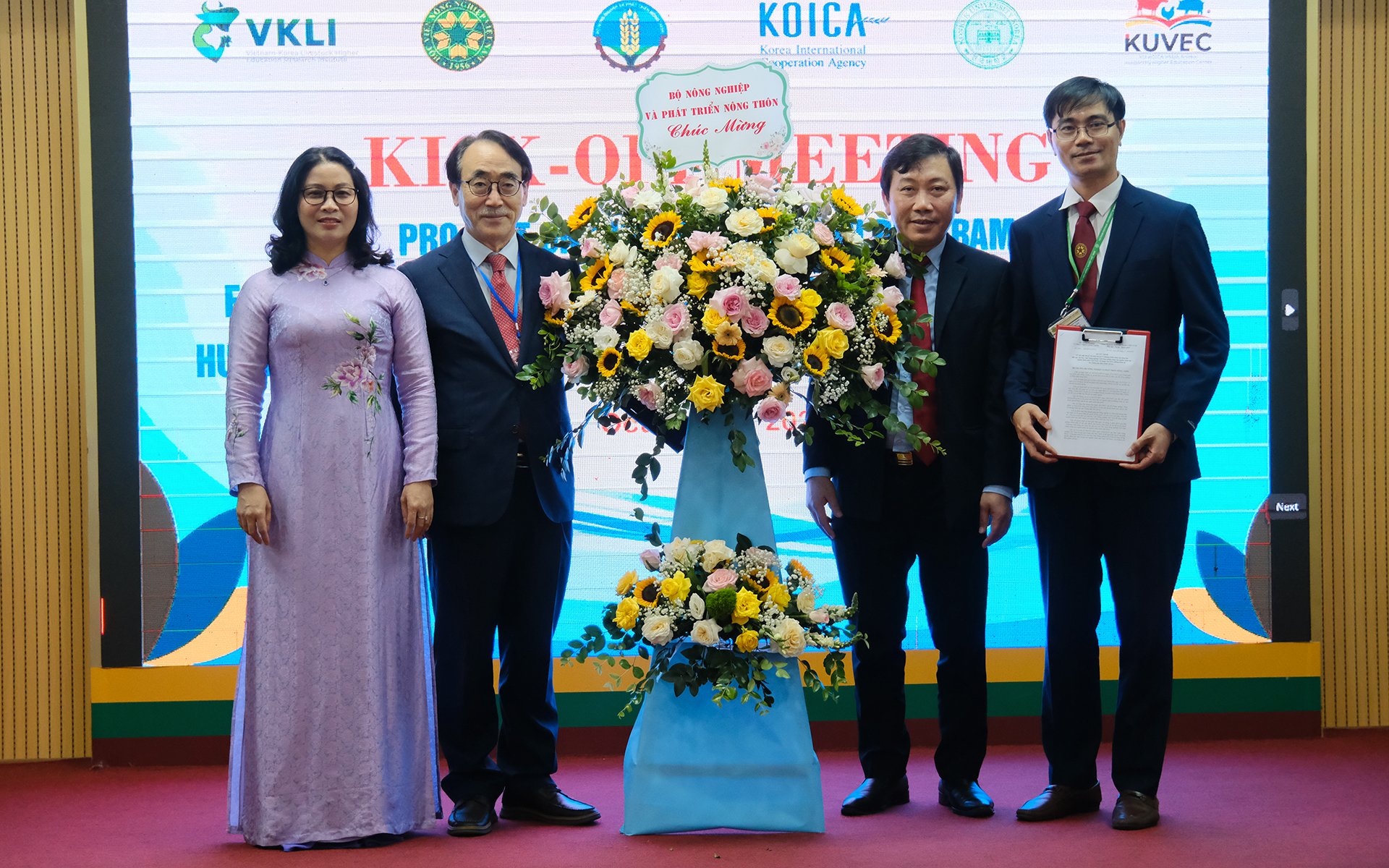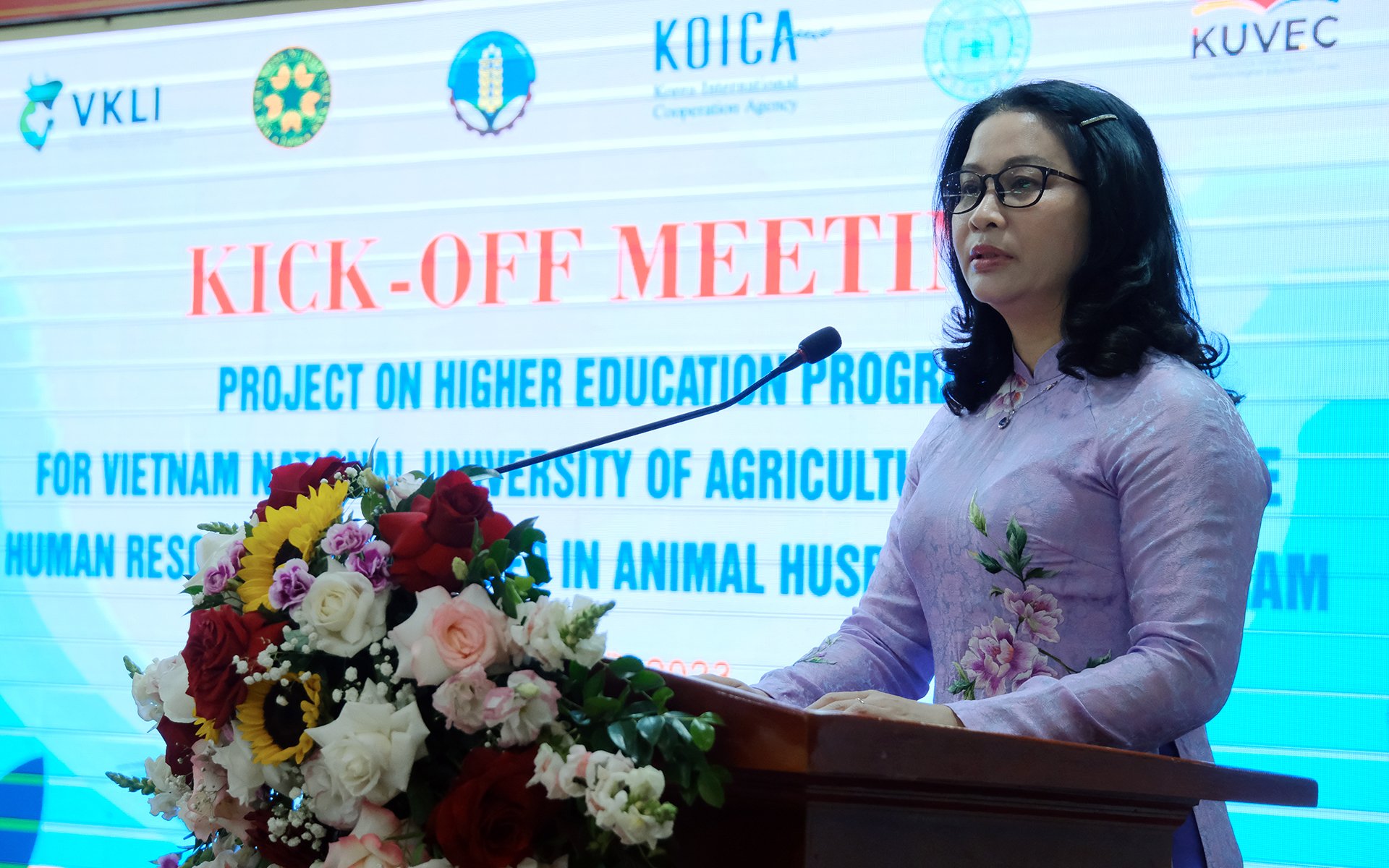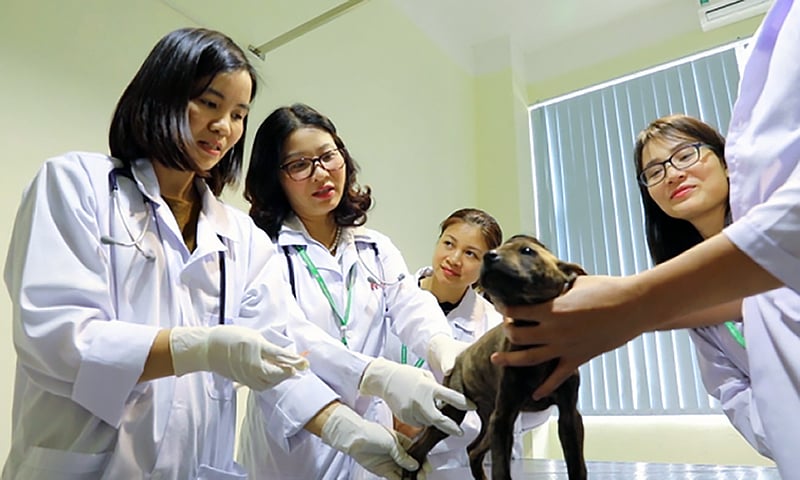November 25, 2025 | 10:17 GMT +7
November 25, 2025 | 10:17 GMT +7
Hotline: 0913.378.918
November 25, 2025 | 10:17 GMT +7
Hotline: 0913.378.918

On behalf of the Ministry of Agriculture and Rural Development, the Director of the International Cooperation Department, Nguyen Do Anh Tuan, awarded the project investment decision and gave flowers to the Vietnam National University of Agriculture. Photo: Bao Thang.
The project "Higher Education Program for Vietnam National University of Agriculture to Enhance Human Resources Specialized in Animal Husbandry of Vietnam" is funded by the Korean Government with non-refundable ODA capital, with a total cost of more than 13 million.
The project is implemented from 2021 to 2030 with the overall objective of contributing comprehensively to Viet Nam's livestock development by establishing cutting-edge ICT livestock technology and supporting a higher education base at the Viet Nam National University of Agriculture ('VNUA').
The five main components of the project are: Improving higher education through consulting on livestock industry policies and institutions; Improving the curriculum, training environment, and laboratory environment; Capacity building for lecturers, livestock industry officials, and staff of relevant agencies; Supporting students in the field of entrepreneurship, job searching and activating links between universities and businesses; Established the Vietnam - Korea Livestock Research and Training Institute (VKLI) under VNUA.
Among these, Prof. Dr. Nguyen Thi Lan, Director of VNUA, is very interested in implementing the establishment of VKLI.
"The establishment of the livestock training research institute will be a premise for students of the Vietnam National University of Agriculture to arouse their passion for research and innovation, worthy of becoming high-quality human resources for the livestock and livestock sector," she said.

Prof. Dr. Nguyen Thi Lan, Director of the Vietnam National University of Agriculture. Photo: Bao Thang.
According to Mrs. Lan, human resource training must be associated with scientific research. Any student entering the Vietnam National University of Agriculture knows the motto "Scientific research is the vitality of the university".
Therefore, over the years, the school has always focused on creating source technologies and technical advances that are highly applicable in practice. Thus, the Vietnam National University of Agriculture will help students get closer to what is happening in real life.
After establishing the project management board, the Vietnam National University of Agriculture will plan, organize, and monitor project activities according to the goals and evaluate project progress and annual operating results.
Implemented until 2030, the project to improve human resources in the livestock industry is the most long-term project, with many activities that profoundly impact teaching, scientific research, science and technology transfer, and policy research in livestock production.
Professor. Kim Soo-ki, Project Manager of the Korean side, said that KOICA Vietnam has a lot of experience managing ODA projects. Therefore, with this 10-year project (including survey time), he is confident that the final result will succeed.
Mr. Hong Ki-ok, an Agricultural Counselor, at the Korean Embassy in Vietnam, acknowledged that the project to improve training capacity for livestock production would be a premise to launch and promote cooperative projects and further cooperation programs between the governments of Vietnam and Korea.

Prof. Dr. Nguyen Thi Lan and students in the laboratory. Photo: VNUA.
On behalf of the Ministry of Agriculture and Rural Development, Mr. Nguyen Do Anh Tuan, Director of the Department of International Cooperation, acknowledged that Vietnam's agricultural sector in general and livestock sector in particular still face many challenges.
Specifically, farming households still account for a relatively large proportion, the epidemic situation is increasingly complicated, export value is still modest compared to the potential, and raw material sources and animal feed are only getting independent part.
"Training human resources for the livestock sector is always a goal that the entire industry persistently strives towards in order to implement the sustainable livestock development strategy set by the Government and the Ministry of Agriculture and Rural Development," Mr. Tuan expressed.
Mr. Tuan assessed that Korea is a developed country and a model for Vietnam as well as many developing countries in the region to research and learn valuable experiences to advance quickly, advance strongly, and participate deeply in global value chains.
Through cooperation in many fields, two-way trade turnover, as well as ODA investment capital from Korea into Vietnam, is increasing, according to Mr. Tuan. The Director General shared: "Not only economic relations but also the relations between the two countries' people are also increasingly close, reflected in the number of about 200 thousand Koreans living in Vietnam."
Stating that the Vietnam National University of Agriculture has been and will be a crucial university, training many high-quality human resources for the industry, Mr. Tuan wishes the school to create more specific and valuable products with high application through the project. This will be a solid step, helping "Made in Vietnam" livestock products meet requirements from demanding markets and expanding export paths.
Translated by Tuan Huy

(VAN) Heavy rains make aquatic species more vulnerable to disease. Proactive water management and high-tech systems help farmers prevent outbreaks and protect yields.

(VAN) Greenhouses are shifting production mindsets in Binh Lu commune, enabling farmers to ‘weather the sun and rain’ and secure stable vegetable harvests throughout the year.

(VAN) Green transition is crucial for the Mekong Delta amid climate change and stricter standards, offering a path toward sustainability.

(VAN) Dong Thap promotes agricultural restructuring, forms large specialized farming zones, raises the value of agricultural products and develops toward ecological and high-tech directions.
/2025/11/22/4018-4-213342_747.jpg)
(VAN) The Mekong Delta Agricultural Experts Club has attracted 143 experts and researchers to participate in providing consultancy and contributing initiatives to the development of one million hectares of high-quality rice.

(VAN) Ca Mau’s development of OCOP products opens a path to increasing cooperatives value, helping boost income, expand markets, and affirm collective economy's role.

(VAN) Turning seemingly ordinary coconut shells into unique jewelry and artwork, Nguyen Bang Nhi spreads the value of local culture through her brand, Cocohand.